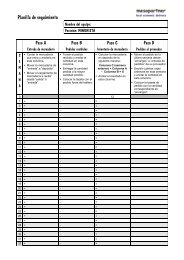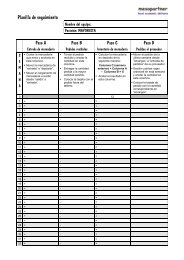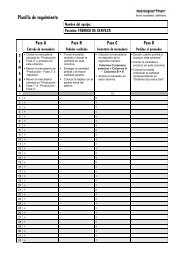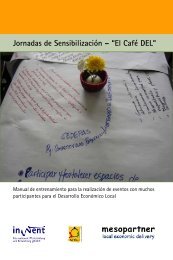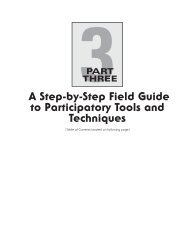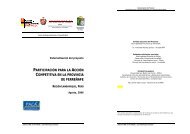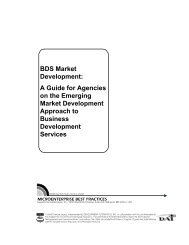McCormick+Schmitz Handbook for value chain research on - PACA
McCormick+Schmitz Handbook for value chain research on - PACA
McCormick+Schmitz Handbook for value chain research on - PACA
You also want an ePaper? Increase the reach of your titles
YUMPU automatically turns print PDFs into web optimized ePapers that Google loves.
A good <str<strong>on</strong>g>research</str<strong>on</strong>g> design <str<strong>on</strong>g>for</str<strong>on</strong>g> a comparis<strong>on</strong> of <str<strong>on</strong>g>chain</str<strong>on</strong>g>s will usually include two elements:<br />
• Some type of survey to gather basic in<str<strong>on</strong>g>for</str<strong>on</strong>g>mati<strong>on</strong>, and<br />
• In-depth interviews (case studies) to probe the issues.<br />
For both, you will want to interview participants in both <str<strong>on</strong>g>chain</str<strong>on</strong>g>s. The survey should<br />
include both core and fringe homeworkers (see secti<strong>on</strong> 12.3 <str<strong>on</strong>g>for</str<strong>on</strong>g> more <strong>on</strong> this distincti<strong>on</strong>),<br />
and will usually be carried out using a structured questi<strong>on</strong>naire. Your case studies will<br />
usually be selected either because they are typical of those in their particular <str<strong>on</strong>g>chain</str<strong>on</strong>g>, or<br />
because they illustrate some problem that you want to highlight.<br />
Once you know how many and what type of interviews you will carry out, you can begin<br />
preparing <str<strong>on</strong>g>for</str<strong>on</strong>g> the actual interviews by lining up your questi<strong>on</strong>s. Remember that you need<br />
to ask two types of questi<strong>on</strong>s: those that are factual, and those that are issue based. The<br />
factual questi<strong>on</strong>s will be handled mainly in the survey, and include such things as age,<br />
experience as a homeworker, other experience, years working <str<strong>on</strong>g>for</str<strong>on</strong>g> particular manufacturers<br />
or intermediaries, etc. (Do we need to include a sample questi<strong>on</strong>naire in the appendix?)<br />
You will also want to ask about key features of the relati<strong>on</strong>ship with the manufacturers:<br />
advance notice of ups and downs in orders, training, technical assistance, piece rates,<br />
prompt payment. Once you have all the questi<strong>on</strong>s you think you should ask, prune the list.<br />
Remove any questi<strong>on</strong> that is not really necessary. This will keep the interview sharp and<br />
focussed.<br />
Case study interviews will deal more with issues. Here you want to discuss particular<br />
difficulties the homeworker has experienced. You might, <str<strong>on</strong>g>for</str<strong>on</strong>g> example, enquire into the<br />
latest c<strong>on</strong>flict and how it was resolved. Although case study interviews can be l<strong>on</strong>ger and<br />
more free-flowing, you still want to maintain your focus <strong>on</strong> the specific issues covered in<br />
your study.<br />
In carrying out the interview, be aware that the homeworker may be uncom<str<strong>on</strong>g>for</str<strong>on</strong>g>table<br />
answering certain questi<strong>on</strong>s. She may fear retaliati<strong>on</strong> from the manufacturers, or she may<br />
feel vulnerable because of her questi<strong>on</strong>able legal status. To help overcome problems of<br />
trust, the <str<strong>on</strong>g>research</str<strong>on</strong>g>er may want to spread her interviewing over more than <strong>on</strong>e visit.<br />
80





